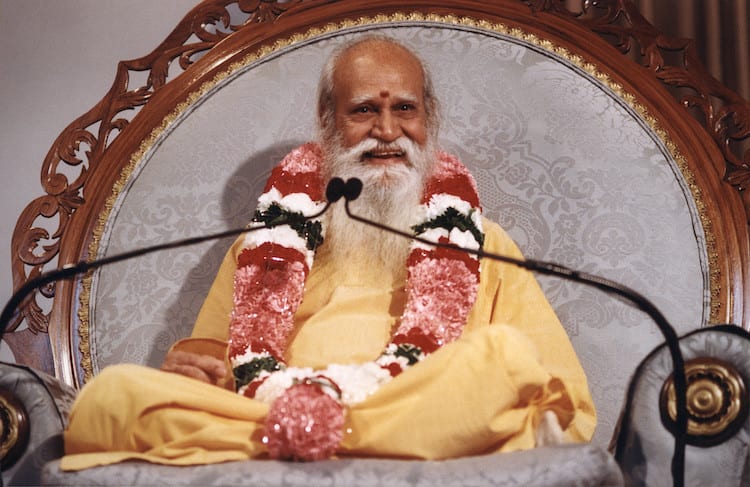“Just because the killing is done by somebody else, somewhere else,
does not mean the karma, the responsibility, is not yours.
If you are eating the meat they provide,
you are contributing to their actions and you share their karma.”
Many people are concerned about the violence in our society and about the threat that violence poses to the very existence of our planet. Our meat diet is part of that violence. We should think about such things and about adopting a policy of ahimsa.
Ahimsa is a Sanskrit word that means nonviolence. Following ahimsa does not simply mean not killing. We cannot live without destroying other lives. When you eat vegetables, you are killing, destroying something. Even if you do not eat anything, you kill. Do you know how many bacteria you kill each time you take a drink of water? Millions. If it is a matter of avoiding killing alone, I would advocate eating meat. Why? Simple mathematical calculations: If you want to eat spinach, how many plants must you kill? Certainly ten or twenty for even one meal. But how many people can eat from just one sheep? Say ten people. If every life you take is one “sin,” which is better? Certainly killing one sheep would be better. So, it is not killing we are talking about here. We are talking about nonviolence.
What do we mean by violence? If I do something to you and you feel hurt, my act was violent. Causing pain is violence. If we want to be nonviolent, our food should come with as little pain as possible. Many people would say, “But plants are alive, too. They feel pain if we pluck and eat them. So why give up meat if not causing pain is the idea?”
Yes, plants have life; animals have life; human beings have life; even an atom has life. In having life we are all equal. But in the expression of consciousness the plant is not as developed as the animal, nor the animal as developed as the human being. Human beings are bestowed with discrimination; it is the human being who even thinks of all this, who thinks of comparing himself or herself with other beings. Animals do not compare themselves with humans. Plants are even less developed in the expression of their consciousness. The more developed the expression of consciousness in a particular form of life, the more pain is felt when you destroy it. Cutting off the branch of a tree causes less pain than cutting off the limb of a pig. Many studies show that plants do experience pain; but, still, we believe it is not as much as the animals experience.
Here is an analogy that might help illustrate this principle. Imagine a classroom of thirty students with a teacher standing in the front of the room, writing on the blackboard. Somewhere in one of the rows two of the students are talking loudly. One is the brightest student in the class. Normally, he would not be doing such a thing; but, today, somehow the other fellow drew him into it. The other boy is “number one” at the other end. He is the worst student and has no interest in studying at all. He simply came to the classroom because it was even worse at home. So, they are both talking. The teacher looks at them and yells, “Hey, you fools! What are you doing there?”
Which of the two do you think would feel most hurt by being called a fool in front of the whole class? The “number one” brilliant boy. The other one might just shrug it off, thinking, “I’ve heard it many times.” Or, he might even feel proud: “Finally, the teacher noticed me, paid some attention to me!” But the first one would say, “I’m sorry, I won’t do it again!” He might even burst into tears because he has never been addressed like that before. How can the same word create two different feelings in two individuals? One had a sharper, more evolved mind. The other one had a duller mind. It all depends on the development of the consciousness. The bright boy’s consciousness was more developed. The other’s was a little dull. So the same action will hurt the evolved soul more than the unevolved soul.
Now, let us apply this analogy to the animals and the vegetables. The animals are supposed to have evolved a little bit more in their consciousness than the plants. The Hindu scriptures say, “Consciousness sleeps in mineral life, dreams in plant life, awakens in animal life.” In animals, we see instinct functioning. Then, in the human level, we see intelligence; and, finally, in the superhuman—the Yogi—intuition functions. It is all the same consciousness functioning at different levels. It is with this awareness that we say the animals feel pain more than the plants. Since we still have to eat to live but we want to reduce the pain-giving, the violence, where should we go? To the plants. With many plants, picking some part of them, scattering the seeds from within a fruit, literally help them grow. You are not hurting the plant. On the other hand, you are expanding its species. You cannot do that with animals. You cannot eat the thigh of a cow and throw the head somewhere and make another cow grow.
Where is our karuna, our compassion? What is happening to our hearts? If you have even once seen pictures of the young seals being killed for their fur, you will never wear fur again. In the same way, if you once saw how the animals die in the slaughterhouse, you never would want to eat meat again. Just because the killing is done by somebody else, somewhere else, does not mean the karma, the responsibility, is not yours. If you are eating the meat they provide, you are contributing to their actions and you share their karma. We say we want a loving world, a peaceful world; but we cannot cultivate that love if negative vibrations get into us. One way in which we can bring negative vibrations into ourselves is through our food. That is why food should come to us as an offering of love.
Whatever we eat should be the product of love. When I say a loving offering, I do not mean that someone cooks a nice chicken soup or broiled steak and then offers it to you lovingly. The question is, “Did the animal who died to make that steak love you?” I do not think that any animal would die lovingly for you. Will a cow come and say, ”Oh, you seem to be very weak and hungry. Would you like my thigh for a soup? Take it.” No, you have to kill it, destroy it. It’s the same when you catch a fish by throwing a worm. Every time you catch a fish, you are literally deceiving it. It is as if you are saying, “Come on, my friend, I will feed you.” But, when it comes to you, you hook it and kill it. Could you say that it is a love offering? The animals we kill hate us. If our food brings hatred, we cannot develop love.
Our human family is starving in many parts of the world People say that there is not enough food for us all, that overpopulation is the cause. But I say that overpopulation is not the problem; rather, human greed is the problem. If we were only willing to care and share, there would be enough for everyone. How can I say this? According to agricultural statistics, you must feed 16 pounds of grain to a steer in order to get one pound of meat, and meat has become a status symbol now in this country. The amount of grain we use to produce meat is almost equal to the amount consumed as food in the poorer countries. Another way of looking at it is this: on the average, an acre of land used for grain production gives five times as much protein as an acre used for producing meat; and an acre of vegetables, fifteen times as much protein. So, to feed a meat-eater, how much more land is needed! If everyone were to become a vegetarian, there would be plenty of food, and plenty of protein, for everyone. As Mahatma Gandhi used to say, “The world has enough for everyone’s need but not for everyone’s greed.”
(by Sri Swami Satchidananda, from The Healthy Vegetarian, reprinted in the IYTA Newsletter May 2007.)



